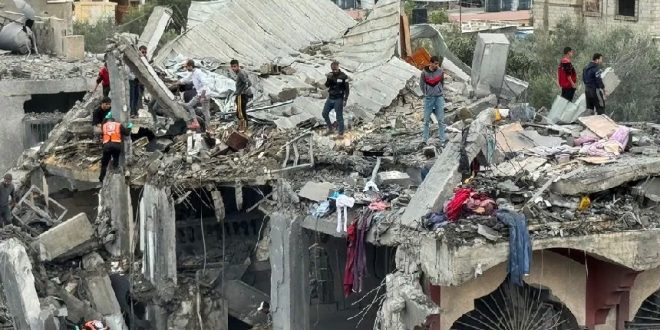23-12-2023
GAZA CITY: The mother and grandfather of five-month-old Palestinian baby Muhammad Hani al-Zahar held his dead body in front of a hospital following the resumption of hostilities in Gaza on the first day of December but when footage of the grief-stricken family holding the body in their arms went viral on social media, many posts falsely claimed Muhammad was merely a doll, and not a real baby.
 These claims were amplified in an article by the Jerusalem Post, an influential Israeli newspaper, which showed an image of Muhammad in rigor mortis after his death and said it proved he was a doll. After a backlash, the paper removed the article from its website, saying on X (formerly Twitter) that the report “was based on faulty sourcing”.
These claims were amplified in an article by the Jerusalem Post, an influential Israeli newspaper, which showed an image of Muhammad in rigor mortis after his death and said it proved he was a doll. After a backlash, the paper removed the article from its website, saying on X (formerly Twitter) that the report “was based on faulty sourcing”.
A few weeks earlier, a video of Israeli siblings Rotem Mathias, 16, and his two sisters, Shakked and Shir, went viral online. Rotem witnessed his parents get killed by Hamas gunmen on 7 October as they sheltered in their house in a kibbutz near the border with Gaza.
The viral video featured edited clips from the siblings’ interviews with US outlets ABC and CNN days after the attack. It falsely claimed that they were “crisis actors” who were lying about their parents’ deaths and struggling to hold their laughter in front of cameras.
These are just two examples – viewed millions of times each – showcasing the social media schism in the Israel-Gaza war that has brought denial of atrocities and human suffering to the forefront of online debate about the conflict.
One of the key terms used to deny or minimize human suffering in Gaza is “Pallywood”, a disparaging combination of “Palestine” and “Hollywood”. Its proponents claim fake or staged footage of Palestinian “crisis actors” posing as genuine civilian casualties is regularly shared online to influence public opinion and deceive global media.
 An expert suggests that on X alone, the term “Pallywood” has seen the largest spike in the number of mentions in the past 10 years.
An expert suggests that on X alone, the term “Pallywood” has seen the largest spike in the number of mentions in the past 10 years.
During previous flare-ups of the Israeli-Palestinian conflict in 2014, 2018 and 2021 the word “Pallywood” consistently peaked at either 9,500 or 13,000 mentions in a single month on X. After the 7 October Hamas attack, the number of mentions peaked at 220,000 in November.
Media Verify found that among those sharing the term “Pallywood” on social media in the past months, including X, Facebook and Instagram, were Israeli officials, celebrities and popular bloggers from Israel and the US.
On the other hand, while supporters of the Palestinians do not have a single term used to deny atrocities committed by Hamas on 7 October in Israel, posts making such claims routinely get millions of views on social media. Some falsely say that Hamas did not kill civilians on that day, or that the scale of civilian casualties has been massively exaggerated. Some even go further, falsely claiming that most of the victims were actually killed by the Israel Defense Forces, not Hamas.
Experts specializing in reconciliation efforts worry that viral disinformation which denies the other side’s suffering can be dehumanizing, and may impact the longer-term prospects of mending the relations between the communities affected. (Int’l News Desk)
 Pressmediaofindia
Pressmediaofindia




